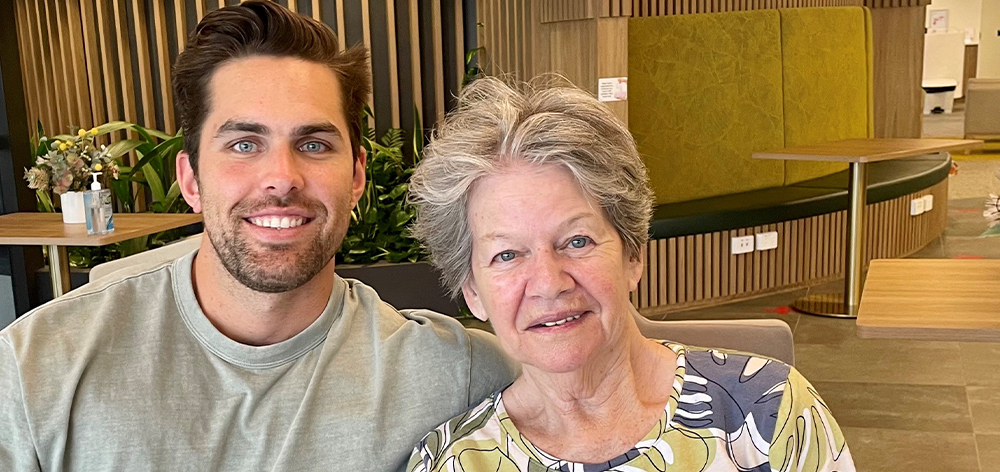13 Oct 2022

HEIDI DOUGLASS | h.douglass@unsw.edu.au
Jackson Skirka, adoring Grandson of 75-year-old Marlene and lawyer with Henry William Lawyers in Sydney, wants his Nan to know that he’ll always be there to support her through her Alzheimer’s journey, and do everything in his capacity to ensure she feels happy, safe and loved.
Jackson, who visits his Nan in the dementia ward of Belrose Nursing Home every few weeks, acknowledges how challenging the dementia journey is – for the individual, for carers and family members.
“My beautiful Nan was diagnosed with Alzheimer’s disease about 3 years ago.
“In September of 2018 my Grandad had passed away from pancreatic cancer and I think the shock and stress of that escalated things for my Nan,” says Jackson.
“We moved her into care just 5 months ago.”
Prior to Marlene’s diagnosis, Jackson wasn’t aware how prominent Alzheimer’s disease was within the Australian community, nor that there were 55 million people globally with dementia.
“I had no idea about the prevalence of dementia, or how difficult the journey was for everyone involved,” says Jackson. “At times it is really hard for me to witness Nan enduring the effects of Alzheimer’s. She was such an energetic and vibrant lady.
Her diagnosis has not only changed her life dramatically, but that of everyone in our extended family. I feel compelled to make a difference not just for my Nan – but for all the people living with dementia, and their families.
Jackson Skirka
Marlene Skirka was born in Calcutta, India. She came from humble beginnings and was one of 6 children. Her family moved to Australia when she was just 5 years of age in search of a better life, and she has spent the last two decades living in Collaroy. Incredibly, Marlene never had a driver’s licence and would often walk from Collaroy to Dee Why to do all the shopping.
Marlene was an avid squash player and traveller, and she and Jackson’s Pop would spend half the year travelling north and then staying in Wonga Beach, Cairns, to fish and relax.
Jackson is the oldest of 11 grandchildren, affording him the good fortune of many wonderful memories growing up with his Nan.
“We are an extremely close family and spent a lot of time around each other growing up. We were always at family BBQ’s, going to the beach or venturing up the coast on summer holidays together. Not long before Nan’s diagnosis we shared an extraordinary family holiday on Lord Howe Island – there are moments with my Nan from that trip that I will treasure forever,” says Jackson.
“Being the eldest grandchild, I got to spend a lot of time with my Nan, and from a very young age she was quite involved with my upbringing.
“My fondest memory of Nan is watching her prepare food. She was an incredible cook and her specialty was Shepherd’s Pie, which was always made with enormous amounts of love.
“It’s ironic in a way that it was my Nan’s cooking that triggered us to recognise the first sign that something was different in her. It was just a few months before her formal diagnosis that Nan had prepared some meatballs for me – which were fine on the outside but completely raw in the middle.
“I knew in that moment something was wrong.”
Although Jackson is grateful that his Nan still recognises him and his family, he can see that she has deteriorated since going into care.
The biggest challenge for me is acknowledging that it may come to a point in the near distant future where Nan no longer recognises me, or her family.
Jackson Skirka
With someone in the world diagnosed every 3 seconds, Jackson’s ultimate hope for research is that there is a cure. He is also an advocate for healthy brain ageing and supportive of the need for research for better clinical care for people living with dementia - and this year ran his first half marathon for CHeBA in the Blackmores Sydney Running Festival in his Nan’s honour.
“It was brutal but one of the best things I’ve ever done, and really special to have my Nan in my thoughts the whole time, which definitely pushed me through those last few kilometres.”
“I am motivated to support dementia research and CHeBA’s initiatives in any way that I can. I would love the opportunity to lead the team of lawyers at Henry William in next year’s Sydney Running Festival as well as get involved in Wipeout Dementia.”
Dementia is vastly under-funded, relative to cancer and heart disease, even though the disability caused by dementia in the older population is much greater. We know that research is the key, and we need a quantum leap in investment to meet these challenges. CHeBA is perfectly placed to meet the challenge.

Your support of this Appeal will have a direct impact on CHeBA’s critical research and help pave the way towards a brighter future for generations to come.


